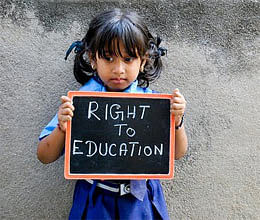
The deadline for meeting the infrastructure provisions under the Right To Education came to an end today, with widespread apprehension about the closure of schools which have failed in implementing them.
Even as the Human Resource Development Ministry has turned down request from some states to extend the deadline, reports suggest that hundreds of schools across the country are lagging far behind in implementing the infrastructure norms.
According to RTE Forum, a voluntary organisation working in the education field, approximately eight million children are currently out of schools and the figure could be much more. More than 30 per cent schools in the country lack toilets for girls and more than five per cent have no provision for drinking water.
The RTE Act providing free and compulsory education to children in the age group of 6 to 14 came into effect from April 1, 2010. A three-year timeline was stipulated to ensure that all schools meet the norms as mandatory by the Act.Schools which have failed to meet the norms face the threat of being closed down.
The government had last week ruled out extending the deadline beyond March 31 for schools to meet RTE requirements even as it conceded that many states were lagging behind.
HRD Minister M M Pallam Raju was evasive when asked about the fate of the schools which fail to meet the RTE requirements after March 31, as he barely said they would ensure the requirements are complied within the “shortest possible time”.
Besides schools facing the prospect of closing down if they are not RTE compliant, the government also faces the threat of being challenged in court by stakeholders in the event of non-compliance.
The Central Square Foundation, headed by Ashish Dhawan, said big states such as Uttar Pradesh, Andhra Pradesh and Bihar have hardly been able to achieve 25 per cent admission for students from economically weaker sections in neighbouring schools.
He said government should clarify and simplify the application and admission practices and ensure timely and adequate reimbursement to private schools. Only Rajasthan and Gujarat are the states that have made some progress in implementing the 25 per cent norm.
Even as the Human Resource Development Ministry has turned down request from some states to extend the deadline, reports suggest that hundreds of schools across the country are lagging far behind in implementing the infrastructure norms.
According to RTE Forum, a voluntary organisation working in the education field, approximately eight million children are currently out of schools and the figure could be much more. More than 30 per cent schools in the country lack toilets for girls and more than five per cent have no provision for drinking water.
The RTE Act providing free and compulsory education to children in the age group of 6 to 14 came into effect from April 1, 2010. A three-year timeline was stipulated to ensure that all schools meet the norms as mandatory by the Act.Schools which have failed to meet the norms face the threat of being closed down.
The government had last week ruled out extending the deadline beyond March 31 for schools to meet RTE requirements even as it conceded that many states were lagging behind.
HRD Minister M M Pallam Raju was evasive when asked about the fate of the schools which fail to meet the RTE requirements after March 31, as he barely said they would ensure the requirements are complied within the “shortest possible time”.
Besides schools facing the prospect of closing down if they are not RTE compliant, the government also faces the threat of being challenged in court by stakeholders in the event of non-compliance.
The Central Square Foundation, headed by Ashish Dhawan, said big states such as Uttar Pradesh, Andhra Pradesh and Bihar have hardly been able to achieve 25 per cent admission for students from economically weaker sections in neighbouring schools.
He said government should clarify and simplify the application and admission practices and ensure timely and adequate reimbursement to private schools. Only Rajasthan and Gujarat are the states that have made some progress in implementing the 25 per cent norm.








